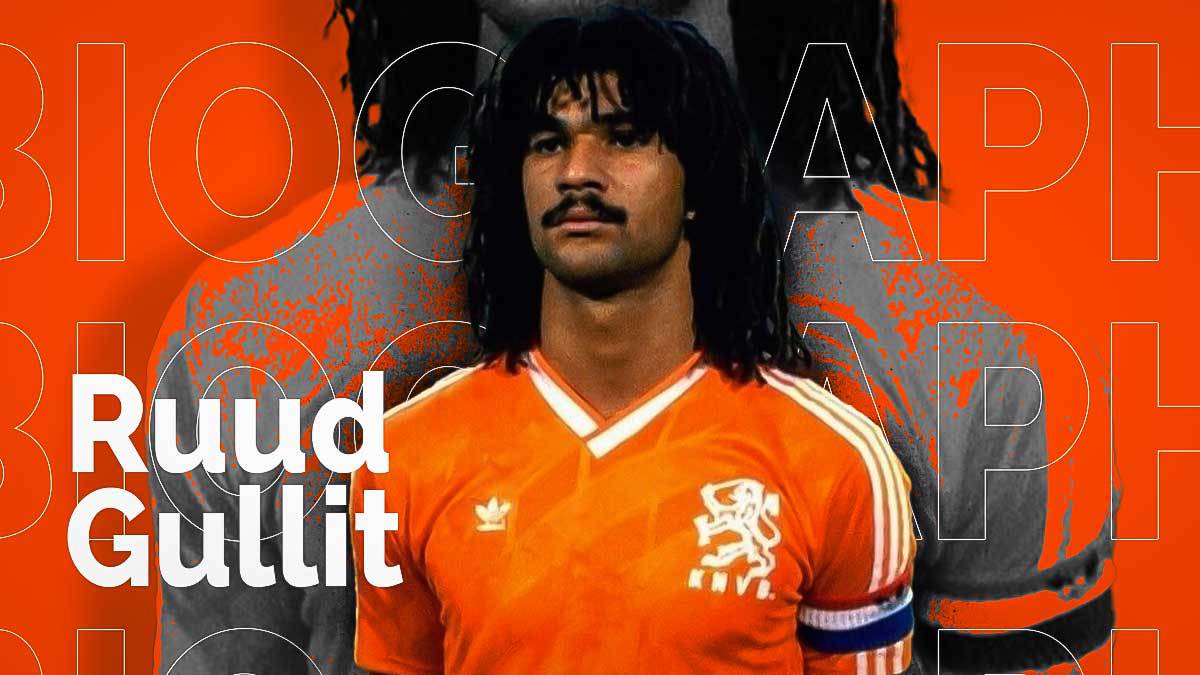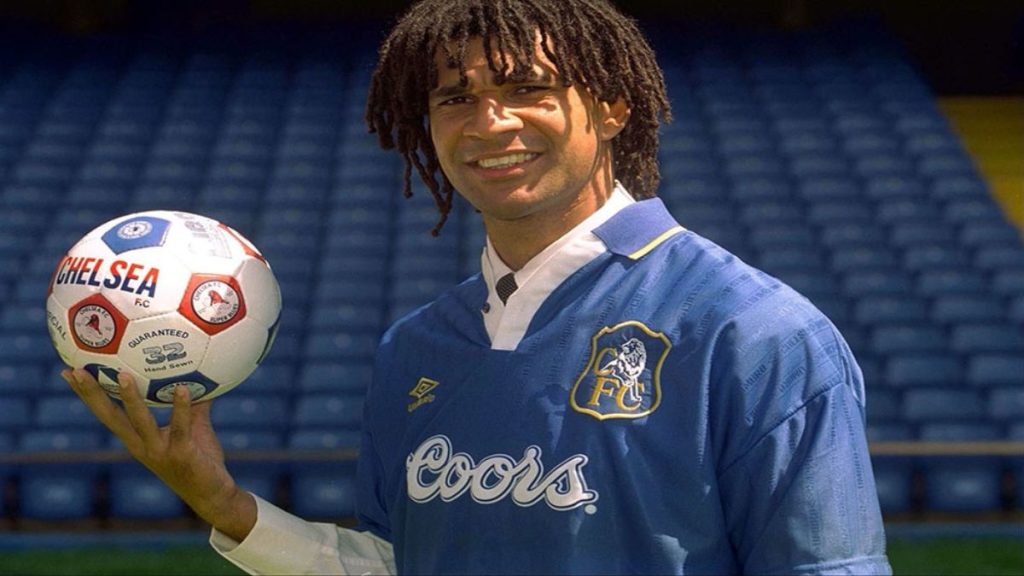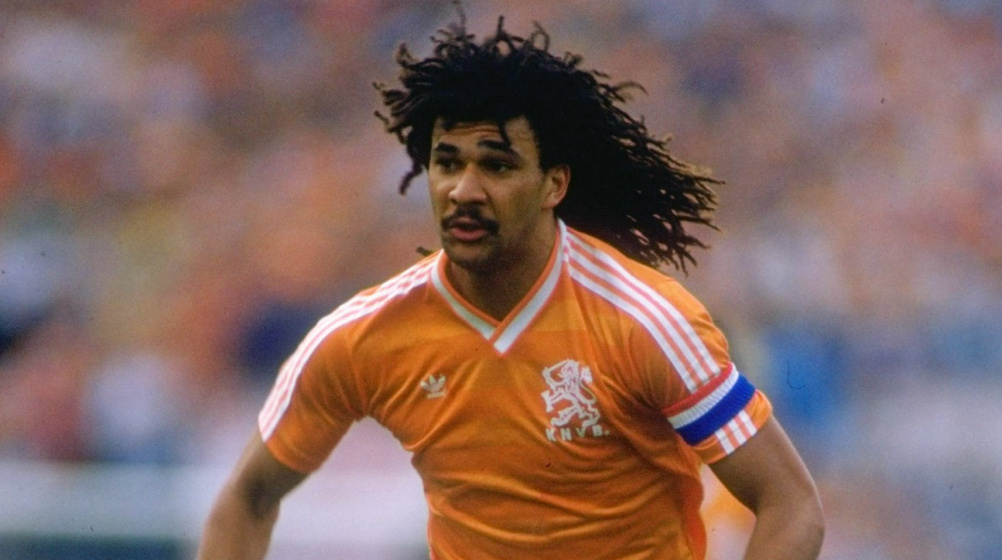Ruud Gullit

Ruud Gullit, born Rudi Dil on September 1, 1962, is a retired Dutch footballer and former manager. He played professionally during the 1980s and 1990s, showcasing his skills as a defender, midfielder, or forward. In 2004, FIFA recognized him as one of the Top 125 greatest living footballers as part of their 100th-anniversary celebration.
Gullit served as the captain of the Netherlands national team, leading them to victory at the UEFA Euro 1988. He also participated in the 1990 FIFA World Cup and Euro 1992. In his club career, Gullit made a significant move from PSV to AC Milan in 1987, setting a world record transfer fee. Known as "the black Tulip," he formed a notable Dutch trio at Milan alongside Marco van Basten and Frank Rijkaard. Gullit achieved success with Milan, winning three Serie A titles and two European Cups.

In 1995, Gullit joined Chelsea, where he became player-manager a year later. In his debut season, he led Chelsea to FA Cup success, marking the club's first major title in 26 years. He became the first overseas manager to win the FA Cup. Gullit received the Ballon d'Or in 1987 and was named the World Soccer Player of the Year in 1987 and 1989. While primarily known as an attacking midfielder, he showcased versatility by playing in various positions throughout his illustrious career.
Early Life:
Ruud Gullit, born as Rudi Dil on September 1, 1962, in Amsterdam, is of Surinamese and Dutch descent. His father, George Gullit, came from Suriname, and his mother, Ria Dil, was Dutch. The Gullit family lived in modest conditions on the top floor of a small apartment building. George Gullit worked as an economics teacher, and Ria Dil worked as a custodian at the Rijksmuseum.

Gullit's introduction to football occurred in the streets of Rozendwarsstraat, where street football played a crucial role in his early development. He initially joined the Meerboys at the age of ten but later moved to Amsterdam Old West, where he played street football alongside Frank Rijkaard. Gullit then joined the DWS club, catching the attention of the Dutch youth team.
During his time at DWS, Gullit adopted his father's surname, considering "Gullit" more fitting for a football player than his registered surname from his mother.
Club Career:
HFC Haarlem:
- Gullit signed professionally for HFC Haarlem on September 22, 1978, under coach Barry Hughes.
- He made his debut at just 16 years and 11 months old, becoming the youngest player in Eredivisie history.
- Gullit made 91 league appearances for Haarlem, scoring 32 goals.
- In the 1981–82 season, Haarlem finished fourth, and Gullit scored a memorable goal against Utrecht.

Feyenoord:
- Gullit moved to Feyenoord in 1982, making 85 league appearances and scoring 31 goals.
- In the 1983–84 season, Feyenoord completed the league and cup double.
- Gullit was named Dutch Footballer of the Year during his time at Feyenoord.

PSV:
- In 1985, Gullit transferred to PSV for 1.2 million Dutch guilders.
- He helped PSV win the Eredivisie title in 1986.
- Gullit scored 46 goals in 68 league appearances for PSV.

A.C. Milan:
- Gullit signed for A.C. Milan in 1987 for a then-world record transfer fee.
- He won Serie A titles and European Cups with Milan.
- Gullit won the Ballon d'Or in 1987 and dedicated it to Nelson Mandela.
- Injuries limited his playing time in the 1989–90 season.
Sampdoria:
- Gullit moved to Sampdoria in 1993, leading them to victory in the Coppa Italia in the 1993–94 season.
- He briefly returned to Milan in 1994 but rejoined Sampdoria before the culmination of the 1994–95 season.

Chelsea:
- Gullit signed for Chelsea in 1995.
- Initially played as a sweeper, Gullit was later moved to midfield, where he scored six goals.
- He played a key role in Chelsea's journey to the FA Cup semi-final.

International Career:
- Gullit made his international debut for the Netherlands in 1981.
- He helped the Netherlands win Euro 1988, scoring a header in the final against the Soviet Union.
- The Netherlands suffered disappointment in the 1990 World Cup, losing to West Germany in the second round.
- In Euro 1992, the Netherlands were eliminated by Denmark in the semi-finals on penalties.
- A dispute with manager Dick Advocaat led to Gullit's departure from the national team before the 1994 World Cup.
In December 2013, Gullit and Advocaat expressed regret over their dispute on Dutch television.

References;
- "Ruud Gullit". Barry Hugman's Footballers. Retrieved 21 December 2017.
- "Football: Gullit delights in being different". Independent.co.uk. 22 October 2011. Archived from the original on 2 February 2019. Retrieved 1 February 2019.
- "Ruud Gullit: Overview". Premier League. Archived from the original on 18 November 2023. Retrieved 14 October 2023.
- "Vader Gullit beschuldigt 'arrogante Ajacieden'". Trouw.nl. 1 June 1994. Archived from the original on 26 June 2013. Retrieved 25 June 2014.
- "Pele's list of the greatest". BBC Sport. 4 March 2004. Archived from the original on 3 March 2015. Retrieved 10 May 2014.
- "The history of the world transfer record" Archived 2 January 2016 at the Wayback Machine. BBC News. Retrieved 10 May 2014
- "Gullit: The Netherlands' Black Tulip". FIFA.com. Archived from the original on 4 September 2015. Retrieved 28 April 2015.
- Kuper, Simon (25 June 2000). "Rijkaard finally gets frank". The Guardian. ISSN 0261-3077. Archived from the original on 5 March 2016. Retrieved 6 March 2016.
- Walsh, David (23 September 2007). "The Big Interview: Ruud Gullit". The Sunday Times. The Times. Archived from the original on 20 July 2008. Retrieved 12 July 2010.

































































